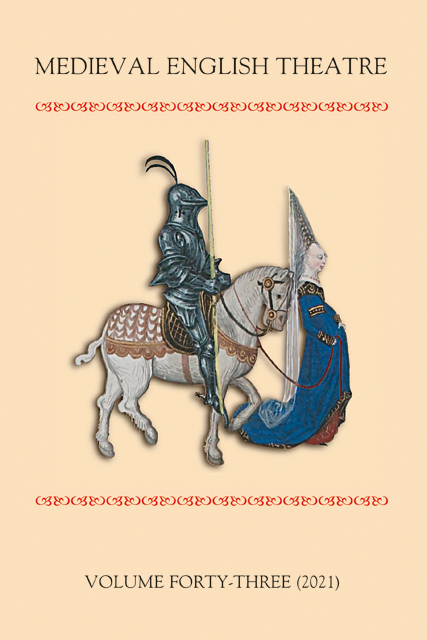Book contents
- Frontmatter
- Contents
- List of Illustrations
- Note on Cover image and Online Links
- List of Common Abbreviations
- Editorial
- The Prince of Peace and the Mummers: Richard II and the Londoners’ Visit of 1376/1377
- Chivalric Entertainment at the Court of Henry IV: The Jousting Letters of 1401
- ‘Maskerye claythis’ for James VI and Anna of Denmark
- Peers and Performers in the Reign of Henry VI
- ‘That Gam Me Thoght Was Good!’: Structuring Games into Medieval English Plays
- Feminism, Theatre, and Historical Fiction: Anna of Cleves in 2021
- Appendix Transcription and Translation of BL MS Cotton Nero D II fols 260v–262r
- Editorial Board
- Submission of Articles
Appendix - Transcription and Translation of BL MS Cotton Nero D II fols 260v–262r
Published online by Cambridge University Press: 20 December 2023
- Frontmatter
- Contents
- List of Illustrations
- Note on Cover image and Online Links
- List of Common Abbreviations
- Editorial
- The Prince of Peace and the Mummers: Richard II and the Londoners’ Visit of 1376/1377
- Chivalric Entertainment at the Court of Henry IV: The Jousting Letters of 1401
- ‘Maskerye claythis’ for James VI and Anna of Denmark
- Peers and Performers in the Reign of Henry VI
- ‘That Gam Me Thoght Was Good!’: Structuring Games into Medieval English Plays
- Feminism, Theatre, and Historical Fiction: Anna of Cleves in 2021
- Appendix Transcription and Translation of BL MS Cotton Nero D II fols 260v–262r
- Editorial Board
- Submission of Articles
Summary
This transcription and translation was roughed out by Meg Twycross, and then received thorough and very much appreciated scrutiny from Philip Bennett. It would be difficult now to unpick their contributions from each other, so we have left them unattributed.
The following does not purport to be a scholarly edition of the text of the challenges, merely a transcription and tentative translation of the version in BL Cotton MS Nero D II. (For the manuscript, see <www.bl.uk/manuscripts/Viewer.aspx?ref=cotton_ms_nero_d_ii_f252r>). It preserves the rhetorical punctuation, which gives a sense of how the challenges might have been delivered.
Since this version, like the others, is a later copy, it has inaccuracies and miscopyings. Some of the more obvious are marked in the transcription, though otherwise there is minimal editorial intervention. Occasionally the version in National Library of Scotland Advocates’ MS 32-6-9 fols 63–69 provides a suggestion, but that version too has its problems.
The translation also attempts the slightly archaic vocabulary and syntax of a royal proclamation, though it is of course a moot point quite how archaic it would have sounded to the original audience – especially since it was delivered in Insular French, much of which has become the accepted vocabulary of honorifics. The syntax is rhetorical and declamatory and proceeds by accumulation. It often defers the important point to the end of the sentence, as is the custom: ‘EDWARD VI, by the grace of God King of England, France, and Ireland, defender of the faith and of the Church of England and also of Ireland in earth the supreme head, to all our most loving, faithful, and obedient subjects, and to each of them, greeting’.
Some vocabulary is almost impossible to translate because it encapsulates a system of courtly values the modern descendants of which to us sound stilted: noblesse (‘nobility’), gentilesse (‘gentility’), bontie (‘bounty’). The ethos of jousting is another problem. The young knights ask to be instructed in le fait desbatement darmes, ‘the fact/performance of the entertainment of arms’. We have translated this as ‘the practice of the recreation of arms’.
The names of the challengers are another problem. Many of them come from the vocabulary of love-literature and again we do not have a direct equivalent.
- Type
- Chapter
- Information
- Medieval English Theatre , pp. 80 - 107Publisher: Boydell & BrewerPrint publication year: 2022



